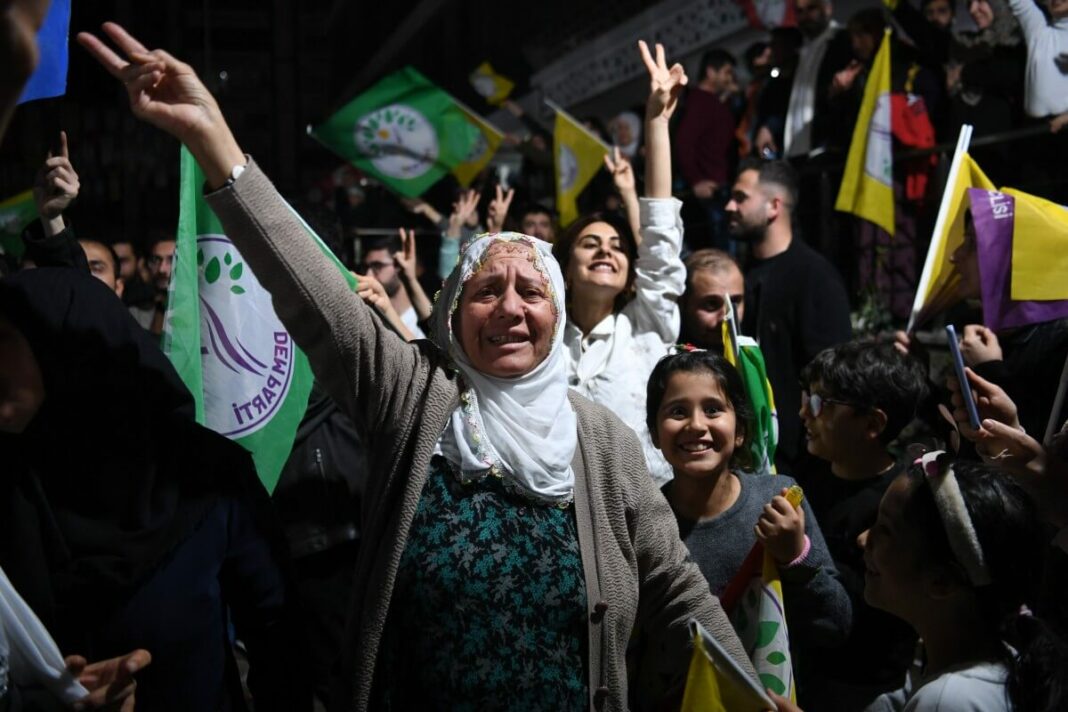Even before the conclusion of a closure case against the Peoples’ Democratic Party (HDP), the predecessor of the Peoples’ Equality and Democracy Party (DEM Party), Turkey is now discussing the prospects of the closure of the DEM Party following a call from a far-right leader.
Pro-Kurdish parties in Turkey are frequently accused of links to the outlawed Kurdistan Workers’ Party (PKK), and dozens of their politicians and members are in jail on terrorism charges. In the past, many such parties were closed down by the Constitutional Court due to their alleged links to the PKK, listed as a terrorist organization by Turkey and its Western allies. Every time a party was closed, another one was established in short order.
The Green Left Party (YSP), which ran in the May general election on behalf of the HDP to avoid the risks that could arise from the party’s possible closure, renamed itself the DEM Party last October. In the past, when pro-Kurdish parties faced similar threats, they either fielded independent candidates or ran under the banner of other parties.
Six months after its appearance on the Turkish political stage, the country has begun to discuss the party’s closure based on a recent call from Devlet Bahçeli, leader of the far-right Nationalist Movement Party (MHP) and an ally of President Recep Tayyip Erdoğan.
In a statement earlier this week Bahçeli called for tough measures against the DEM Party including the revocation of the citizenship of its members, the confiscation of their assets and the closure of the party.
Bahçeli made his call targeting the DEM Party based on a recent incident in the southeastern province of Diyarbakır when an alleged party official demanded the removal of pictures of Mustafa Kemal Atatürk, the founder of modern Turkey, and President Recep Tayyip Erdoğan while making derogatory remarks during the inauguration of co-mayors in the Sur district.
However, the co-mayors distanced themselves from the controversy, stating that the comments were made by a non-member attendee who was mentally challenged and not by party officials.
Bahçeli said the authorities should not waste time with “appointing inspectors” to monitor the party’s activities but should rather act immediately.
Justice Minister Yılmaz Tunç was asked about Bahçeli’s comments about the DEM Party during a reception in parliament on Tuesday on the occasion of the 104th anniversary of the establishment of the Turkish parliament. The minister did not rule out the prospects of the filing of a closure case against the party.
Tunç said a closure case against the DEM Party would be “inevitable” if it does not distance itself from terrorism and continues to engage in activities supporting it, while he accused the party of doing just that.
He said the closure case against the HDP was filed due to its support for terrorism in the form of the PKK.
Turkey’s top prosecutor filed the case against the HDP, which was at the time the second largest opposition party in parliament, in March 2021, accusing it of links to the PKK, which has been waging a bloody war in Turkey’s southeast since 1984.
The HDP and other pro-Kurdish parties deny any affiliation with the terrorist group and say they are working for a peaceful solution to Turkey’s Kurdish issue. They describe the legal assault on their party as politically motivated.
The Kurdish issue, a term prevalent in Turkey’s public discourse, refers to the demand for equal rights by the country’s Kurdish population and their struggle for recognition.
DEM Party Co-chairperson Tuncer Bakırhan, at a party meeting on Wednesday, called on the Turkish government and its allies not to threaten to close down the DEM Party but to correctly read the results of the local elections on March 31.
“They should not point a finger at us. I’ll say it again: Doing politics with closure threats and blackmail has become obsolete,” he said, adding that his party would never give in to threats.
Bakırhan said the ruling Justice and Development Party (AKP) sustained its worst defeat in the local elections and came in second.
“The results of the March 31 elections show the people’s desire for change. It was the defeat of an autocratic mindset at the ballot box,” he said.
The discussion about the DEM Party’s closure comes at a time when the party emerged victorious in the predominantly Kurdish southeast in the March 31 elections, winning a dozen municipalities in the region.
The DEM Party won three metropolitan municipalities out of 30, seven provincial municipalities and 65 district municipalities in the March 31 local elections.
Nationwide support for the DEM Party stood at 5.7 percent, with 2.6 million people voting for it.


